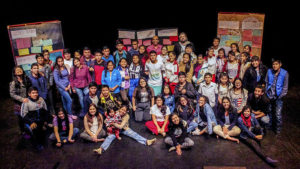Alexcia Chambers is a current Public Diplomacy student who will complete both a Master of Arts in International Relations and a Master of Science in Public Relations by the spring of 2018.
This summer, I had the opportunity to intern in Lima, Peru at ProDiálogo, a civil association that works in conflict resolution and transformation. Given Peru’s landscape, many of its social conflicts revolve around the extractive industries and their interactions with Peru’s government and indigenous communities. ProDiálogo describes conflict as a natural part of human relations—an expression of the disagreements between the interests and needs of those involved. As an intern at ProDiálogo, my job was to analyze the interests and needs of those involved in two separate cases: Las Bambas mine and the Saramuro/Saramurillo oil pipeline.

Seeing as these are both long-term, ongoing conflicts, my first step was to wrap my head around what was happening in these two cases and why. As with all conflicts, dynamics change over time and different personalities play a major part in what gets done and how. Once I understood who the major players were and the role they played in each conflict, I set out to understand the current state of play. To do this, I engaged most with Peru’s ombudsman’s office—Peru’s public defender tasked with (1) protecting the constitutional rights and freedoms of individuals and the community, and (2) monitoring the performance of the state in carrying out its obligations to the people.
In my two months of developing contacts with the ombudsman’s office and interviewing local indigenous leaders, one lesson stood out: the importance of credible state institutions. In socio-environmental conflict, the interests of private industry, private citizens, and government inevitably intersect. In the two cases I analyzed, private citizens (indigenous communities) often feel that the state institutions built to protect their rights are instead more concerned with protecting the broader national economic agenda. In other words, the people see the government as the chief ally of extractive companies, and therefore an enemy of the people.

My relationships and research in Peru allowed me to take broader insights like this one and hone in on the individual people, ministries, and offices involved. Systematically analyzing the needs and interests of government officials, community leaders, and company executives better equip impartial third party actors like ProDiálogo to help transform these conflicts into opportunities in the future.
Alexcia Chambers, Civil Support Planning at NORAD & USNORTHCOM
